|
Rattington Street
Chartham
01227 738316
https://www.artichokechartham.co.uk/
https://whatpub.com/artichoke
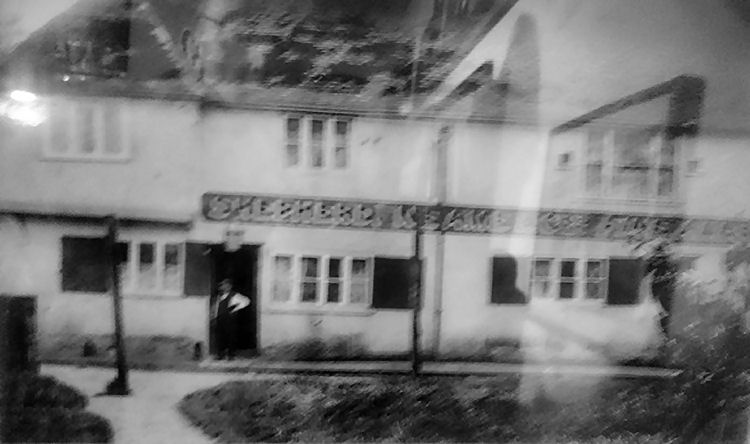
Above photo taken from a glassed framed picture circa 1910. |
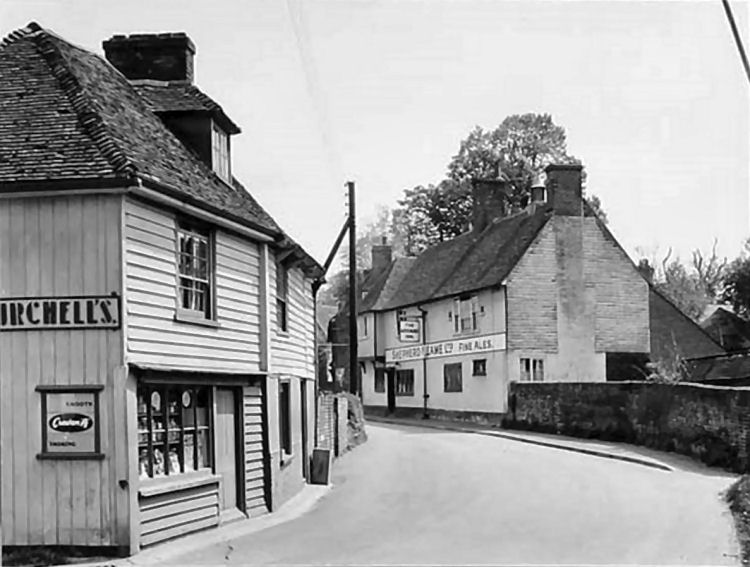
Above photo, 1954, kindly sent by Tim Timpson. |
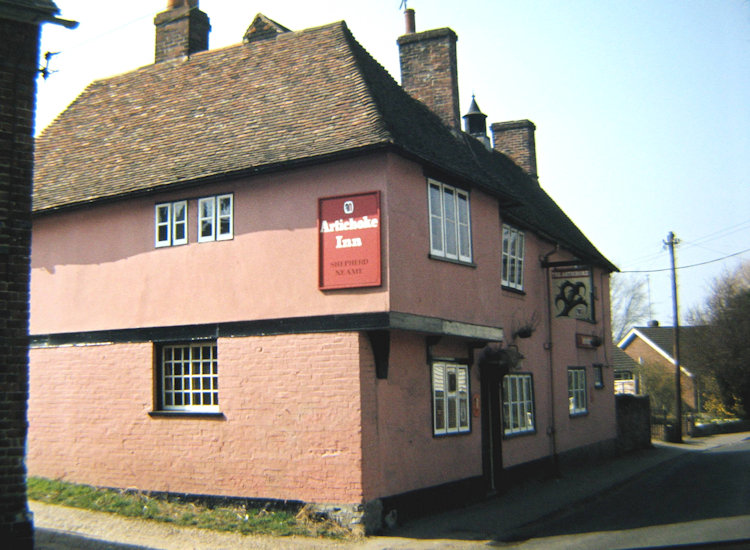
Above photo, 27 March 1982, by Jim Ashby. |
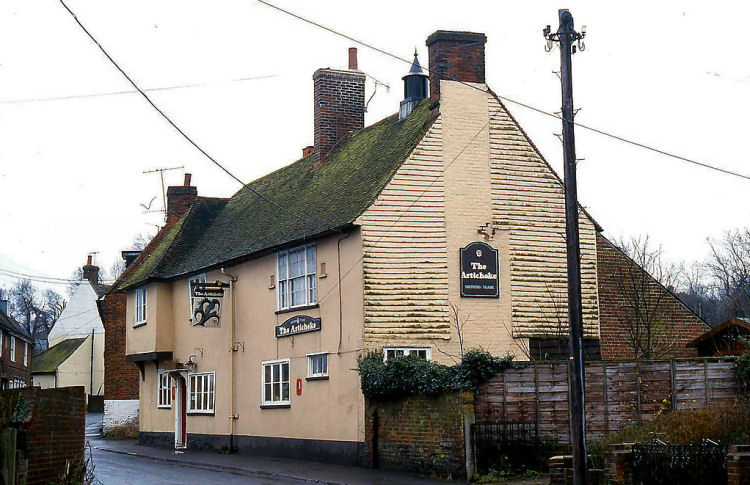
Photo taken in July, 1988 from
http://www.flickr.com
by John Law. |
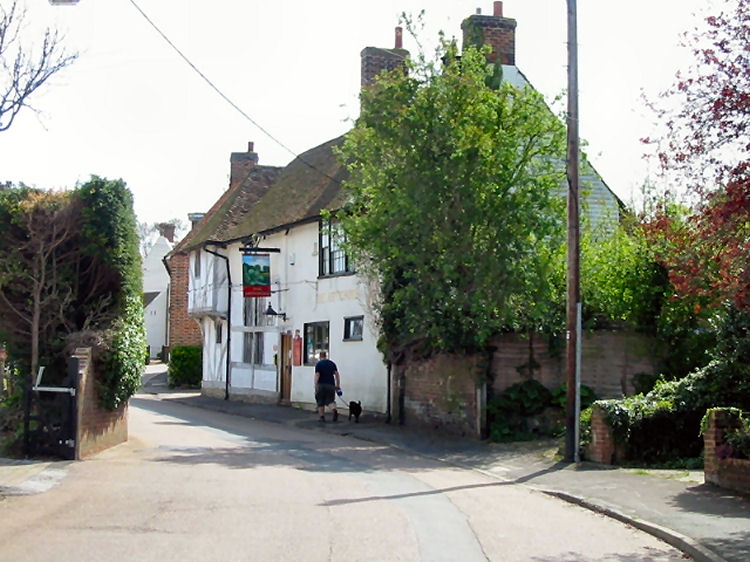
Above photo 2008 by Nick Smith
Creative Commons Licence. |
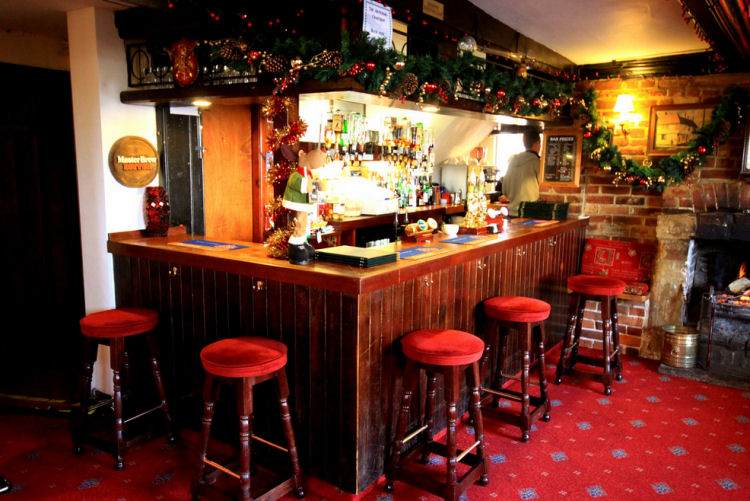
Photo taken 10 December 2011 from
http://www.flickr.com
by Jelltex. |
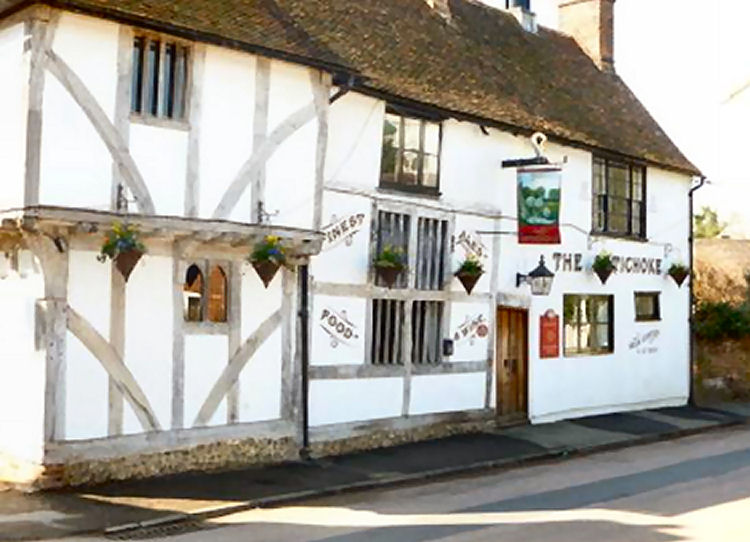
Above photo taken from
http://www.tripadvisor.co.uk August 2012. |
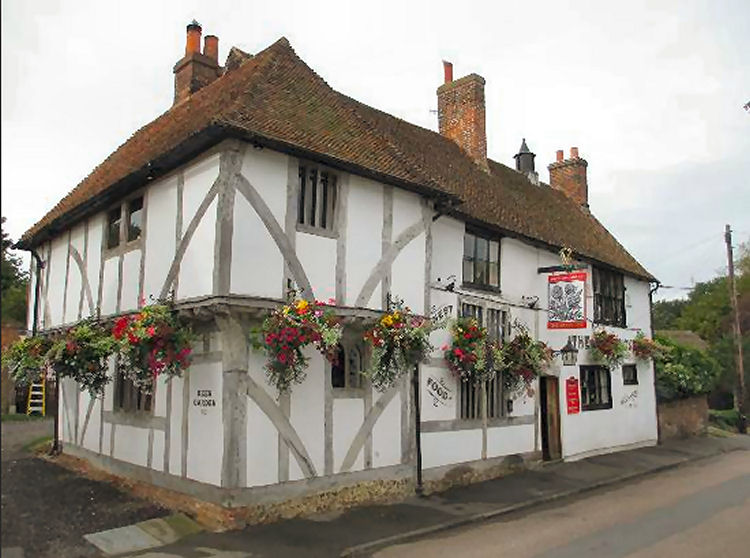
Above photo from
http://www.tripadvisor.co.uk 2013. |
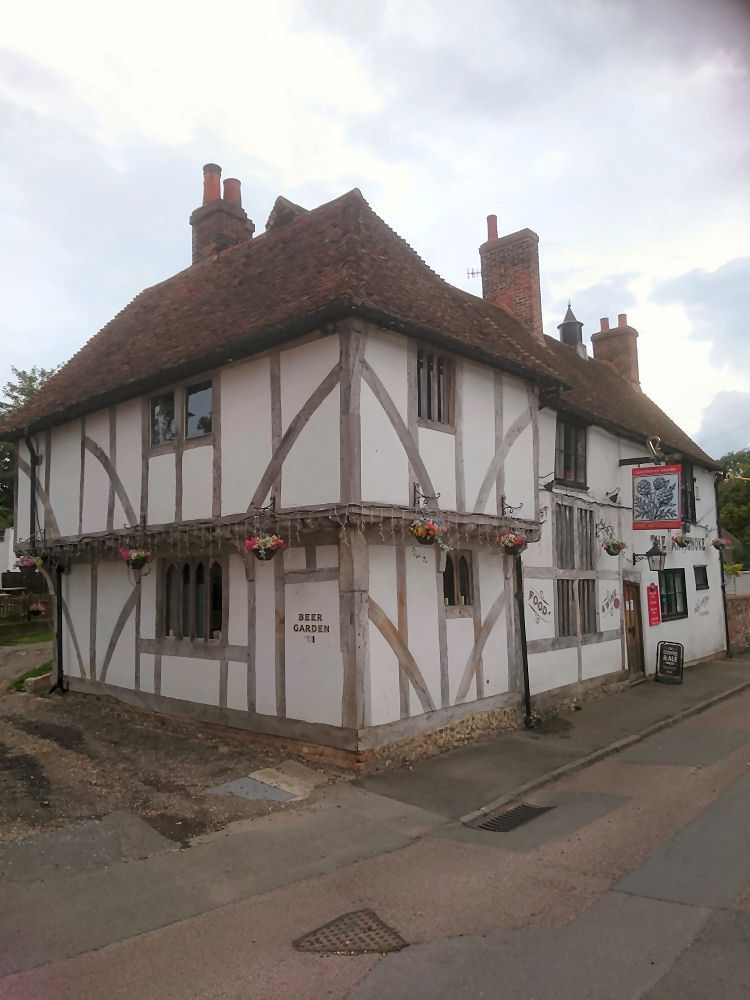
Above photo August 2017, kindly sent by Rory Kehoe. |

Above photo, July 2017, kindly taken and sent by Doogie Moon. |
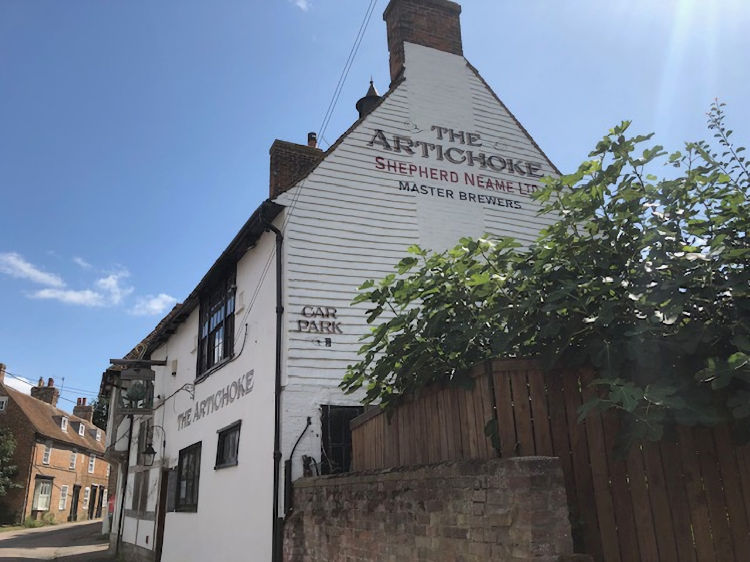
Above photo, 2024, kindly taken and sent by Michael Harris. |
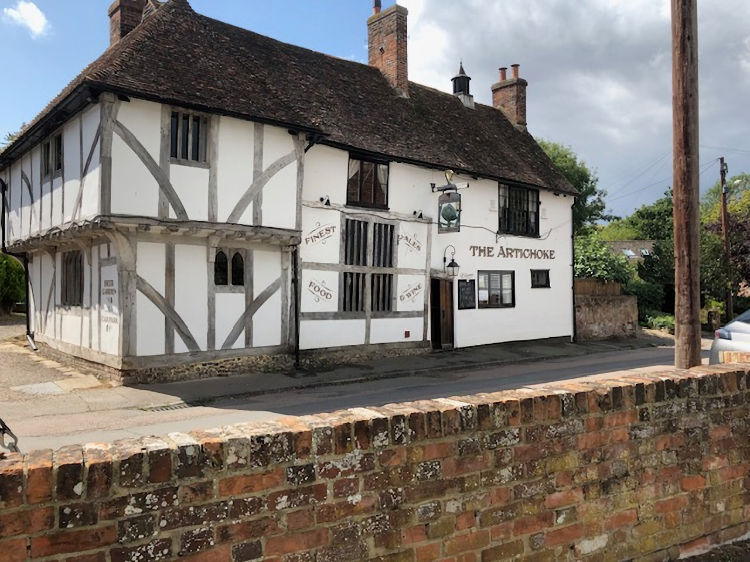
Above photo, 2024, kindly taken and sent by Michael Harris. |
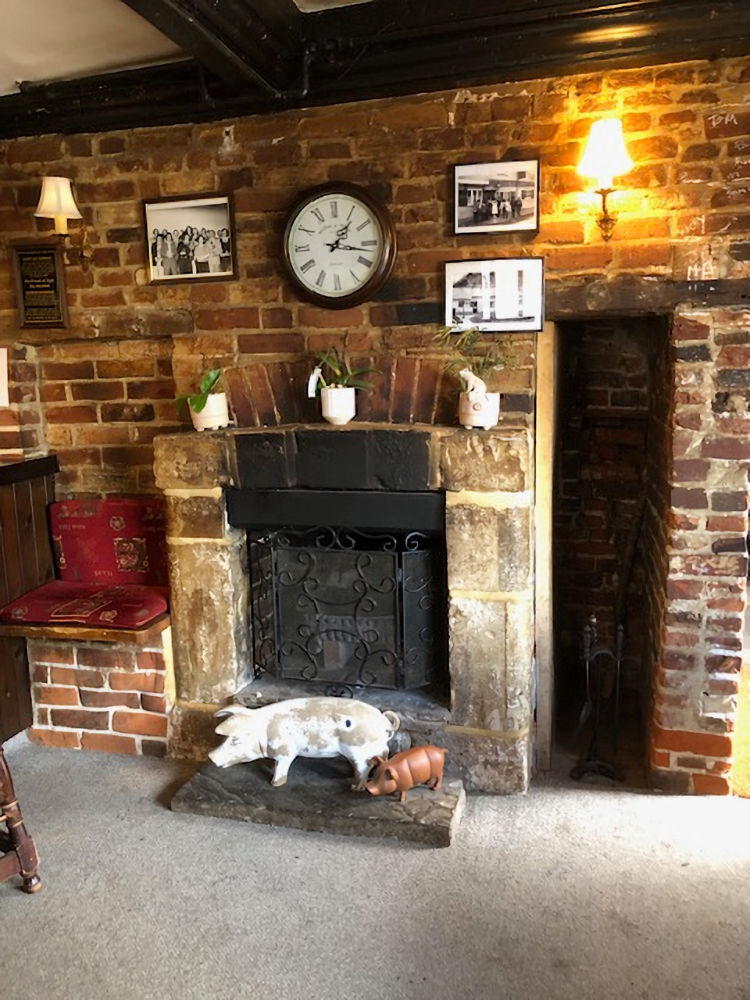
Above photo, 2024, kindly taken and sent by Michael Harris. |
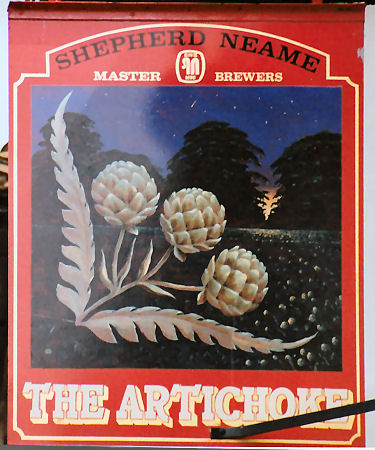 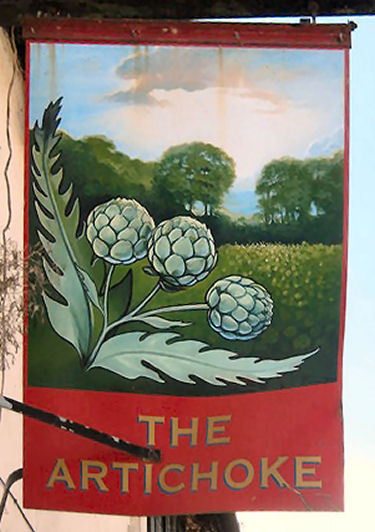
Above sign left, July 1991. Sign right 2012.
Thanks from Brian Curtis
www.innsignsociety.com. |
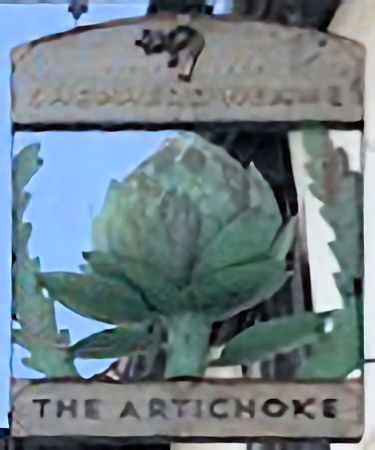
Above sign, 2024, kindly taken and sent by Michael Harris. |
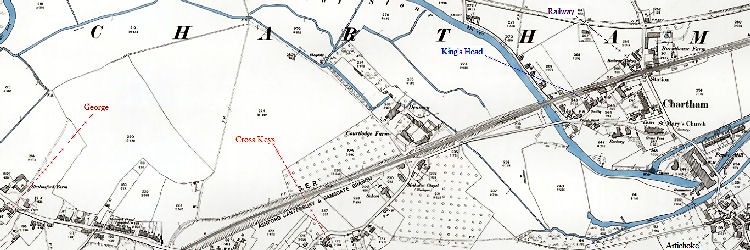
Above OS map 1896. |
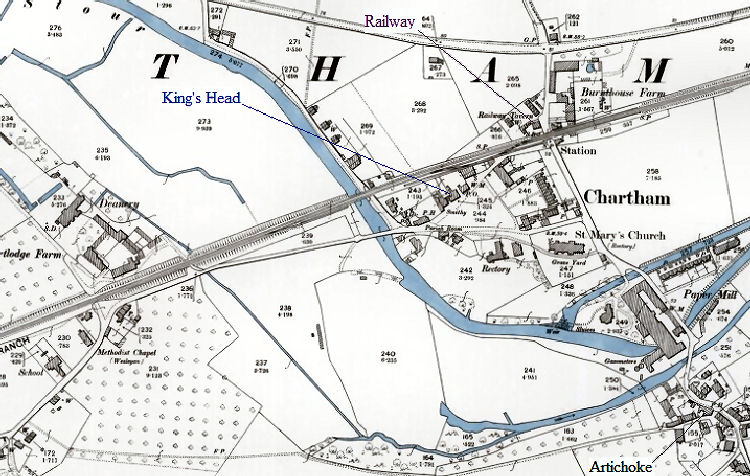
Above OS map 1896. |
The "Artichoke Inn" is an ancient hall-house, perhaps six or seven
hundred years old, and may at one time have been an annexe to a cottage
hospital. An unconfirmed story suggests that the ‘artichoke' name was
adopted because of the inn's connections with a local corn merchant.
Inside there is still a well protruding through the floor, albeit
glass-topped today (2020), and it is said that in the 1650s it was owned by
a Richard Marsh who turned the premises into a brew house before moving on
and being the founder of today's Shepherd Neame brewery.
|
Kentish Gazette 14 January 1778.
Any Gentleman or Lady, possessed of any Sum of Money, not less than £200
and from that up £3000 or any larger Amount, and inclinable to lay the
same out in Annuities, well secured, which will leave a clear Interest
of Ten to Twenty, sometimes Fourteen, or more per Cent. with the
Principal made perfectly safe by good Insurance, by applying in Person
or by Letter, post-paid, for B. B. at the "Artichoke," in Chartham, near
Canterbury, shall be waited on by an Attorney, of Character, etc.
|
|
26 March 1789.
Insured:- Julius Shepherd, Faversham, Kent, brewer.
Other property or occupiers: the Artichoke, Chartham (Jno. Horn,
victualler).
|
|
26 March 1793.
Insured: Julius Shepherd, Faversham, Kent, brewer.
Other property or occupiers: The Artichoke, Chatham
(sic) (John Horne victualler).
|
|
Kent Herald, 8 December 1825.
Death.
Nov. 27, at Westwell, Mr. Horn, aged 92 years, formerly of the "Artichoke"
public-house, Chartham.
|
|
From the Kentish Chronicle 5, November 1859.
ST. AUGUSTINUS PETTY SESSIONS.
(Before W. Delmar, Esq., H. Denne, Esq., and T. H. Mackay, Esq.;).
Frank Foster, a boy 13 years of age, was charged with stealing a pair of
trousers under the following circumstances:-
George Bourne, carrier, of Chartham, said:- On the 17th instant I took a
parcel from Canterbury, which was directed to Mr. Edward Shrubsole, of
Chartham, When I got there I saw the prisoner Frank Foster, my nephew,
and I gave him the parcel, and told him to take it to Mr. Edward
Shrubsole’s. I told him to take care of it as it contained clothes. He
went away in the direction. It was a very short distance from the spot
where I gave him the parcel. On the 19th inst. I saw Mr. Shrubsole, who
said he had not received the parcel. I went and saw the lad and said to
him, "What did you do with the parcel?" He replied "I gave it to Mr.
Shrubsole." I said, "Come with me then to him." He did not to like to
come at first, but he went with me to Mr. Shrubsole, and Mr. Shrubsole
said to him, "You never brought the parcel here." The prisoner then
replied. "No, I gave it to Mr. Stevens." Mr. Stevens lives at the
"Artichoke" public-house, which is near to Mr. Shrubsole's. I went to
Mr. Stevens, and said to him, "the boy says he gave you the parcel." Mr.
Stevens said he had not done so. I again asked the boy about it, and he
then said "I went to Mr. Shrubsole’s shop and put it under a shelf." On
the 24th instant I again saw the boy and asked him if he had found out
anything about the parcel. He said, "No." I said, "I have waited long
enough, and have offered to your fattier for him to make some
arrangement." The parcel was directed to be left for Mrs. Shrubsole, at
the "George and Dragon," Canterbury, in large letters.
Edward Shrubsole:- The parcel to which the last witness refers was not
delivered to me or at my shop on the 17th or at any other time. I
expected a parcel on the day with a pair of trousers from Mr. Denne of
Wingham, tailor. It is usual for him to send his parcels for me to the
"George and Dragon" in Canterbury, and I received a letter from Mr.
Denne saying that this parcel had been so sent. I have made every search
for it in vain.
John Stevens:- I reside at the "Artichoke, in Chartham, and superintend
the business there. The prisoner never left me at the house any parcel
for Mr. Shrubsole.
Police constable J. Hart: I apprehended the prisoner on the charge. I
asked him, "Do you know what you did with the parcel." He said, "No." I
asked him if he left it at Mr. Shrubsole's. He said, "No." I said, "Did
you leave it at Mr. Stevens's." He said, "I forget." Then he said he had
laid the parcel down against the mill and forgot it.
In reply to the bench, the police-constable said he had made every
enquiry for the missing parcel, but had not been able to hear anything
of it.
The boy's mother said he had told her that his uncle gave him the
parcel, and he carried his coat with him at the time. He laid them both
down for the moment while he gave another boy who was with him, some
chestnuts, and then snatched up his coat and forgot the parcel.
The Bench asked why the boy had told so many falsehoods if this were the
case.
The mother said she supposed he had told them for fear of being flogged
for losing the parcel.
The Bench pointed out to the boy the dangerous position in which he was
placed in consequence of the falsehoods he had told.
After some further enquiry, the Bench adjourned the ease till next
Saturday for the production of the other boy referred to, and any
further evidence that can be attained.
|
|
From the Kentish Chronicle, 31 May, 1862.
ST. AUGUSTINE’S PETTY SESSIONS.
SATURDAY. CHARTHAM: CHARGE OF POUND BREACH.
Alexander Avis, gamekeeper, to W. Stutfield Esq., was charged by Mr.
John Bishop, farmer with taking some cattle belonging to Mr. Stutfield,
but which had been impounded by Mr. Bishop, out of the pound at
Chartham, on the night of Saturday, the 17th, or the morning of Sunday,
the 18th instant.
Mr. Delasaux appeared for the complainant, and Mr. Towne for the
defendant.
Our renders will probably remember that on several occasions recently,
Avis, the defendant in this case, has instituted proceedings against
labourers employed by Mr. Bishop for offences against the game laws; and
it transpired that what the labourers did to subject themselves to those
proceedings was done pursuant to instructions from Mr. Bishop. A great
deal of ill feeling had consequently been engendered between Avis and
Mr. Bishop.
Mr. Delasaux having stated the case called a labourer named Pryor, who
deposed impounding the cattle, which he put in a yard on Mr. Bishop’s
farm, he saw the cattle in the yard safe on the Saturday evening.
Mr. I. C. Browne, of Chartham Deanery, proved that the old parish pound
used to be in Mr. Bishop’s yard, and since its removal the yard itself
had been used for a pound.
William Fisher, labourer, deposed that he left the "Artichoke"
public-house at 12 o’clock on Saturday night. As he passed Mr. Bishop’s
premises he saw one cow in the pound and two out. The defendant Avis was
close by and appeared to have charge of the cows. Witness asked him
whose cows they were, but he said he did not know. Witness went to the
railway gate to prevent the defendant driving them through, and he also
called James Smith to assist him. Avis told Smith that if he attempted
to prevent the cows going through he (Avis) would knock his brains out.
James Smith, the man referred to by the last witness, said that between
12 and 1 o’clock on Sunday morning he saw Avis with some cows near Mr.
Bishop's premises. Avis threatened to knock witness's brains out, pushed
him away from the railway gate, and drove the cows through.
It further appeared that, after driving the cows over the railway, Avis
passed some men leaning on a gate, to whom he said— "If you chaps say a
b_____ word about this I will kill you.” This was the case for the
complainant.
Mr. Towne then addressed the bench for the defendant. He alluded to the
fact that no evidence had been adduced to show that Avis took the cows
out of Mr. Bishop's yard. He said be would pass that over, and rely
entirely upon a legal question he was about to raise, which was that
"cows" did not come within the meaning of the Act of Parliament under
which the information was laid. He entered into a lengthened argument to
support his view of the case.
The bench, after consulting briefly with their clerk, held the objection
to be fatal and dismissed the case.
|
|
From the Kentish Chronicle, 16 July, 1864.
SHORT WEIGHTS AND MEASURES AND FALSE SCALES.
A number of cases of short weights and measures and defective scales were
reported to the Court by Mr. Mount, inspector of weights and measures for
the Home Division. After hearing the circumstances the magistrates convicted
and imposed fines as follows:—
Daniel Cozens, landlord of the “Artichoke” public house, Chartham, for three
measures used as pints, fined 2s. 6d. and 8s. costs.
|
|
Whitstable Times and Herne Bay Herald, Saturday 20
September 1902.
CHARTHAM. FIRE AT THE ARTICHOKE INN.
The Kent Fire Brigade, at Canterbury, on Saturday received a call on the
telephone that a fire at the “Artichoke Inn,” Chartham. The message was
received at about four o’clock and in a very short time the Brigade with
their engine were making their way to the scene of the fire. The men were
under the charge of Captain L Ashenden and Lieutenant Drayson. On their
arrival the firemen found that the fire, which occurred in some out
buildings at the “Artichoke” had been extinguished. It could not have broken
out at a more opportune time than it did, for the employees of Chartham
Paper Mills were leaving and they rendered valuable assistance in putting it
out. The fire broke out in a hay loft and the damage, which was slight, is
covered by insurance in the Kent Fire Insurance Office. The stables
belonging to the landlord, Mr Charles Couchman, was damaged to the extent of
about £2 and a similar amount of damage was done to another stable belonging
to Messrs. Shepherd, Neame, and Co. Fortunately there was a pump close by
and there was a plentiful supply of water. The police, under superintendent
Jacobs, were present and rendered invaluable aid in extinguishing the
flames, as did John Warren, a painter at the asylum. |
|
From the
https://www.telegraph.co.uk By Tom Ough, 29 September 2019.
Pub review of The Artichoke, Kent:
'If you’re a walker returned from a sodden ramble,
you might be tempted to sit by the fire'.
Our writer discovers this historic pub in Kent, and a very weirdly shaped
table.
There are various schools of thought as to the best seat in my local pub.
Small groups prefer the fortification of a booth. Solitary readers like the
vantage of a window seat. Lone chatterboxes stand at the bar. I personally
place myself as far from the chatterboxes as possible.
Most pubs work this way, with different patrons having different
preferences. One rare exception, though, is The Artichoke. The pub occupies
a 15th-century building, with bleached half-timbering and a low wooden door,
in the green and, yep, pretty pleasant village of Chartham, near Canterbury.
In the late 1600s, the pub was owned by Richard Marsh, a brewer who would
later found the Shepherd Neame brewery in Faversham, which is nearby.
The Artichoke serves Shepherd Neame beer today, but there’s an even more
visible legacy of its brewing history. Leave the bar and step into the
dining room. Beams, a fireplace, half-timbered brick walls. In the far
corner, there’s a weird octagonal table with a flat, round window in the
middle.
The window is a glass covering of a well shaft, and I’m guessing that the
well was used in Marsh’s brewing. Whether or not that’s true, it’s an
entertaining place to eat a meal. Glimpsed from the doorway, vinegar bottles
and salt and pepper shakers seem to be floating on air. A bit closer and you
can see the old brickwork at the top of the shaft. Crane over the table and
you can see the metal bucket, a couple of feet or so down, and then
darkness. It’s a long way to the bottom.
This, unambiguously, is the Best Seat in the House. Even if you’re scared of
heights (or, in this case, depths), you might enjoy the frisson of
excitement you get from resting your plate on the glass.
On a sunny day, the terrace picnic benches would be nice; if you’re a walker
just returned from a sodden ramble in the Stour Valley, you might be tempted
to sit by the fire. But this octagonal table, with the well shaft that may
as well be a wormhole into the pub’s history: truly, this is the heart of
The Artichoke. |
LICENSEE LIST
MARSH Richard 1650s
HORN John 1789-93+
COUSINS/COZINS Daniel 1841-62 (also papermaker widower age 74 in 1861 ) )
JAMES Albert 1861 (only listed as blacksmith age 39 in 1861 ) )
COZENS Daniel 1864-71+ (age 85 in 1871 ) )
STEVENS Edward 1874+
STEVENS Anne 1881+ (age 55 in 1881 ) )
STEVENS Edward 1882+
GOLDUP James 1891+ (age 57 in 1891 ) )
COUCHMAN Charles 1901-03+ (age 47 in 1901 ) ) 
JONES James Henry 1911+ (age 48 in 1911 ) )
DEAL Austin 1913+
BARTLETT George 1922+
BROWN Harry 1924+ 
BEER William 1930+
ROBINS Robert William 1938+
WHEATLEY Frank 1944+
https://pubwiki.co.uk/Artichoke.shtml
 From the Kelly's Directory 1903 From the Kelly's Directory 1903
 From the Kelly's Directory 1924 From the Kelly's Directory 1924
 Census Census
|

















